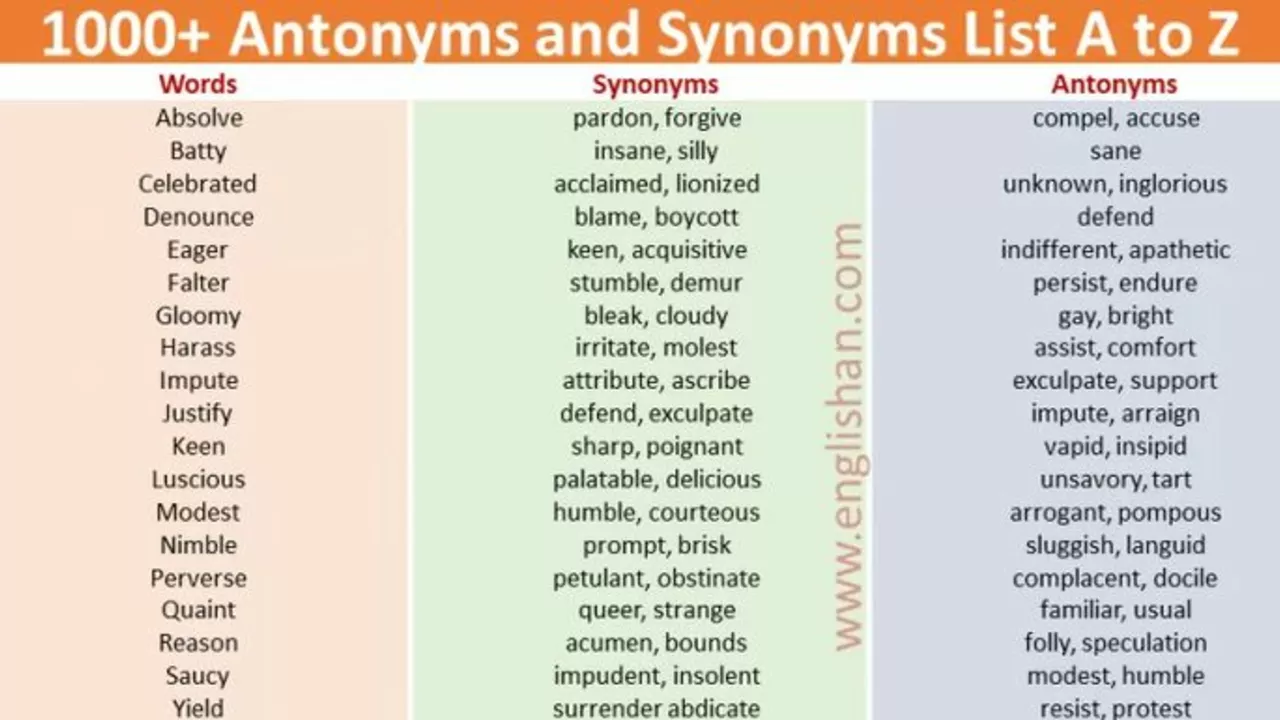Synonyms – Fresh Word Choices for Everyday Writing
Ever felt stuck because the same word keeps popping up in your sentences? That’s where synonyms step in. A synonym is just another word that means almost the same thing, and using it can make your writing clearer, more interesting, and easier to read. In this guide we’ll break down why you should care about synonyms and how to grab the perfect one without overthinking.
Why synonyms matter
First off, swapping words keeps your audience engaged. Repeating "good" ten times makes a paragraph sound dull, while a mix of "great," "excellent," or "superb" adds variety. Second, the right synonym can sharpen a point. Saying a product is "fast" is okay, but calling it "lightning‑quick" gives a stronger impression. Finally, good synonyms help you avoid awkward language. If you’re writing a formal email, you might replace "kids" with "children" to match the tone.
Quick ways to find the right synonym
Here are three fast methods you can use right now:
1. Thesaurus websites and apps. Type in the word you want to replace and you’ll get a list of alternatives. Look for the one that fits the context and matches the level of formality you need.
2. Built‑in word processors. Most programs like Microsoft Word or Google Docs have a right‑click menu that says “Synonyms.” Highlight the word, click the menu, and pick a suggestion. It’s a one‑click fix while you’re drafting.
3. Context clues. Sometimes you can guess a synonym by thinking about the meaning you want to convey. Ask yourself, "What feeling or detail am I trying to add?" If you need a stronger impact, choose a more vivid word; if you need to tone it down, pick a milder one.
When you pick a synonym, read the sentence out loud. Does it still sound natural? Does the new word change the meaning? If something feels off, try another option. It’s normal to test a few before landing on the best fit.
Another tip is to keep a small personal list of favorite synonyms for words you use a lot. For example, instead of always writing "important," you might rotate "crucial," "vital," or "essential" depending on the sentence. Over time this list becomes a handy cheat sheet.
Don’t forget the power of specificity. A generic synonym can sometimes dilute meaning. If you’re describing a smell, "nice" isn’t helpful—"fragrant," "pungent," or "sweet" give a clearer picture. The same goes for emotions: replace "sad" with "downcast" or "heartbroken" if you need extra nuance.
Finally, remember that not every synonym is a perfect match. Some words have slight differences in connotation or usage. For instance, "big" and "large" are similar, but you wouldn’t say "large amount of time"—"big amount of time" sounds more natural. Always check a dictionary if you’re unsure about subtle differences.
Using synonyms is a simple habit that can lift your writing from plain to polished. Whether you’re tweaking a blog post, polishing a report, or just chatting online, these quick tools and tricks will help you find the right word fast. Give them a try in your next piece and notice the difference instantly.

What are some synonyms for 'feasible'? - English words?
In the vast world of English vocabulary, there are several synonyms for the word 'feasible'. These include 'possible', 'doable', 'achievable', and 'practical', among others. Each of these words carries the same core idea of something being capable of being done or carried out. So, next time you're looking for a way to say that something is feasible, remember that there's a whole list of alternatives at your disposal!